APIs play a prominent part in the mobile app development domain. Businesses are individually building their APIs to provide ease of effort to the developers and increase their customer base. For example, Google’s map API is embedded in multiple third-party apps. Further, businesses are exploring new innovations through API development. With it, the start-up economy is gaining a boost using APIs from multiple tech giants.
Hence, the importance to understand APIs in detail becomes necessary for technical and non-technical audiences. This blog will let you understand APIs in depth. You will learn how APIs work and how enterprises gain benefits through API development. Further, you will also learn what practices API development businesses must implement in their API teams, the tools and terminologies, and more
Understanding APIs
The aim of this section is to deliver a brief introduction to APIs. The determined audience for this section is the general audience who has little or no knowledge about APIs.
What Is API?
Application programming interface (API) allows products or services to communicate with other products and services. During the communication process, the backed process stays hidden, delivering Flexibility, simple design, administration, and usage. The main goal of APIs providers is to deliver innovations and ease of building products to other enterprises.
McKinsey Digital says, “For companies who know how to implement them, they can cut costs, improve efficiency, and help the bottom line.”
How Do APIs Work?
Understand APIs as a contract or agreement. The way an agreement allows two parties to communicate with each other or exchange services, API works similarly. Party 1 sends a remote request to Party 2, and Party 2 responds to the request with the response or answer to the query.
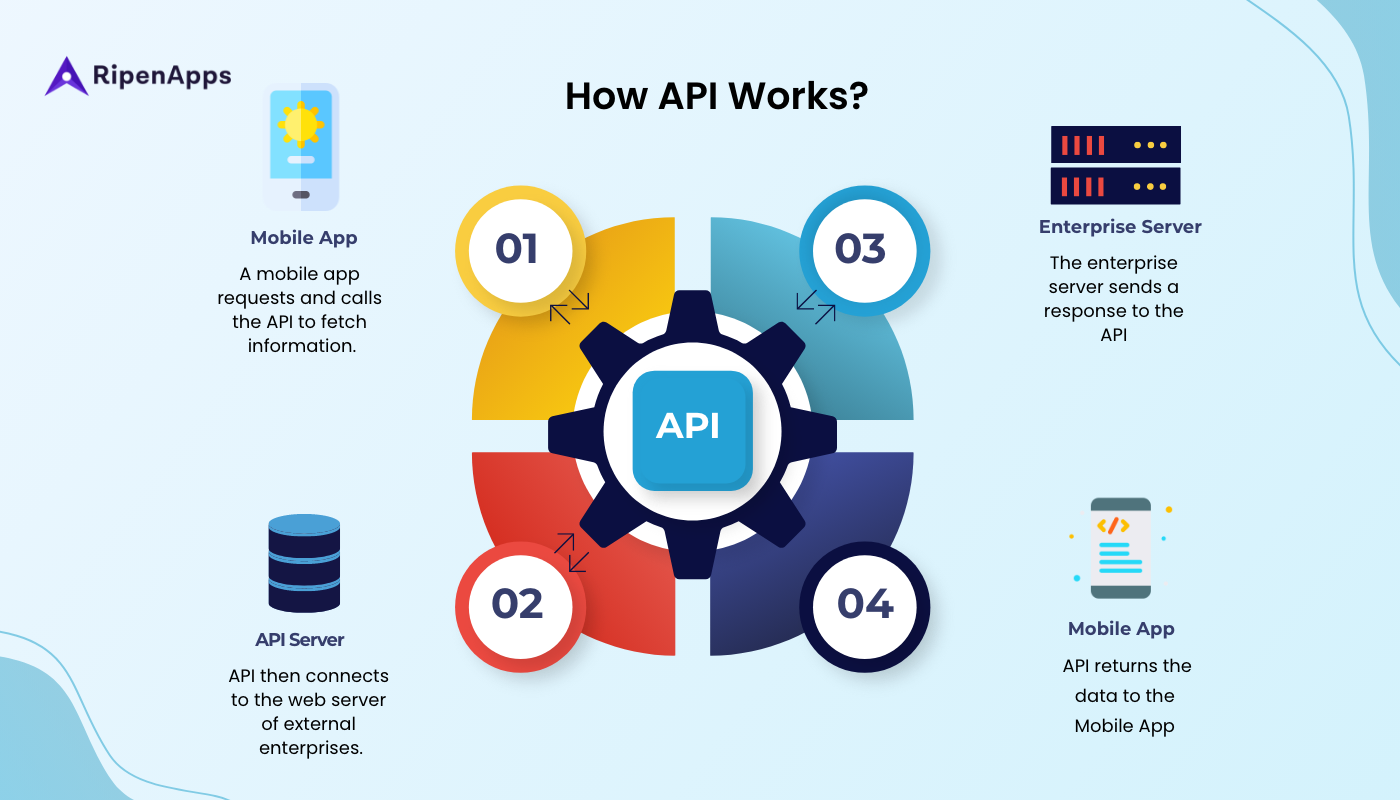
API Types and Release
An API can be released in three ways. They are also known as Types of APIs
- Private: Build to be used internally.
- Partner: Build to be used only with specific business partners.
- Public: Available for everyone, also known as Open API.
- Composite API: Combining different service and data APIs.
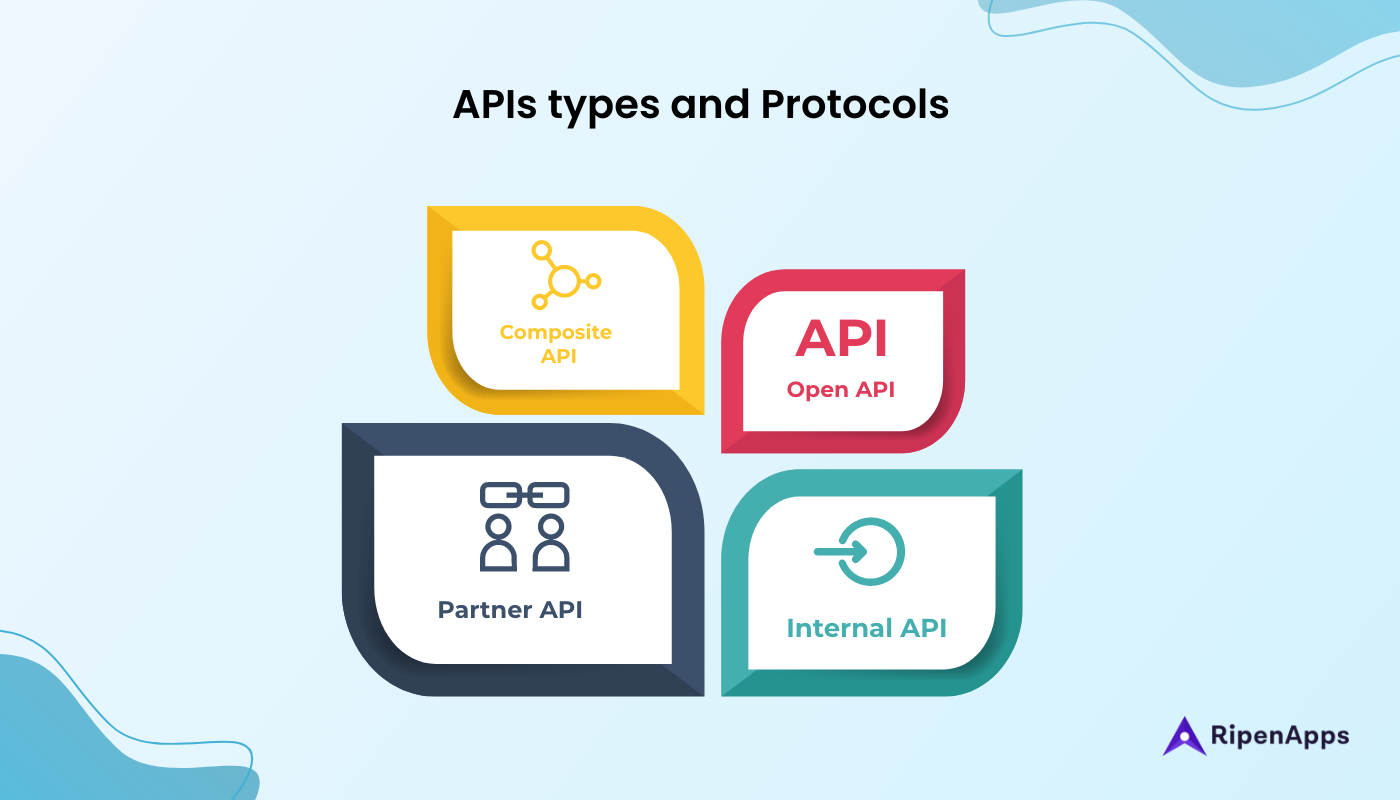
API Development Terminologies
- Endpoint: API has two points, and the one end is Endpoint.
- API Key: The requester has to specify an authorization code known as an API key to pass the request.
- JSON: Common data format used for API requests.
- GET: HTTP method to obtain the resources.
- POST: HTTP method for building resources.
- REST: Programming architectural implementation to enhance communication efficiency.
- SOAP: Messaging protocol for sharing information. It is compatible with XML and application layer protocols.
- Latency: Time taken b API to provide a response.
- API throttling: Regulating the API performance is called Throttling. It is monitored to analyze the performance of API.
How Do Businesses Gain Benefits by Building APIs?
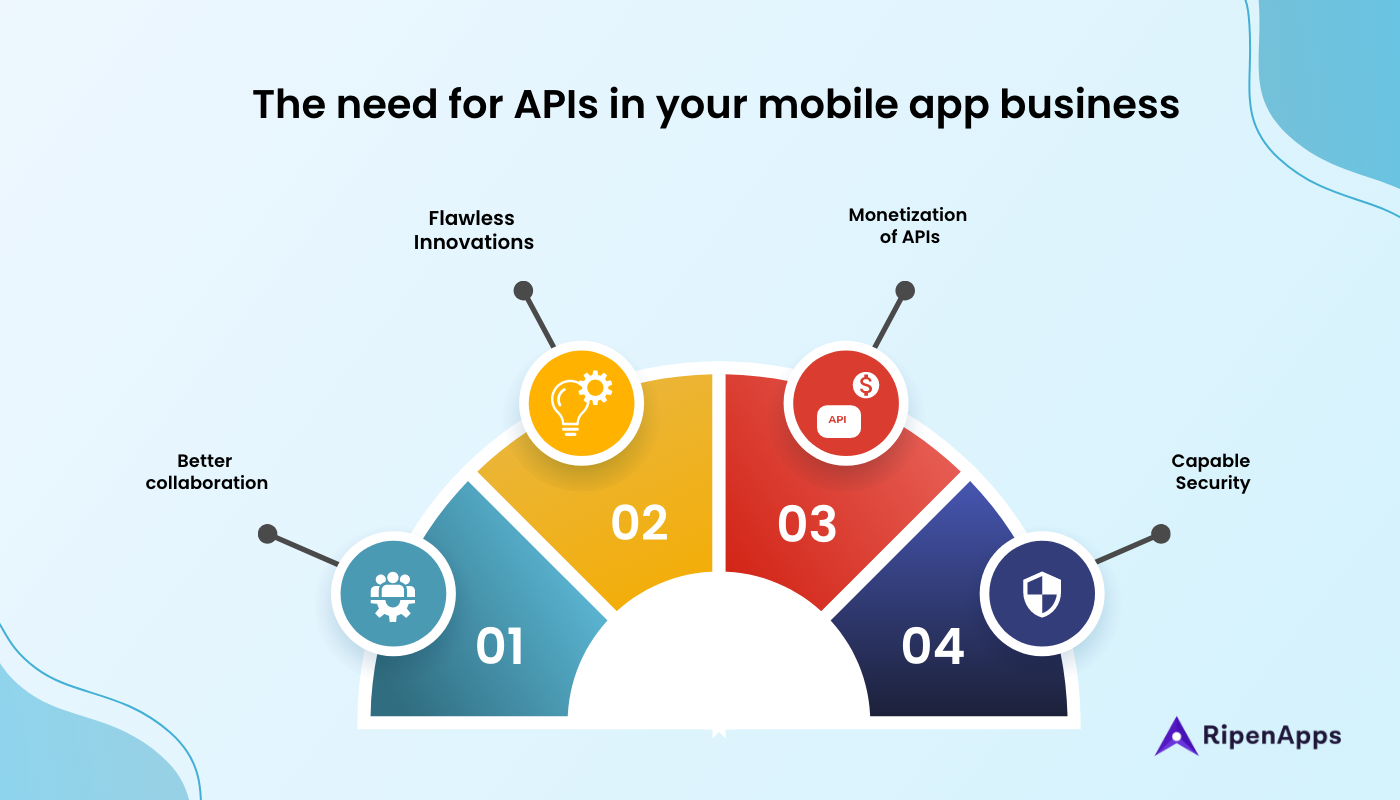
With the API development process, businesses can innovate, gain opportunities and grow rapidly. Here is an example to understand how businesses innovate with APIs.
Imagine you are a digital navigation solution provider like Google Maps. You have your own app with your own user base. A food delivery business wants to integrate map functionality in its business to let customers and delivery partners view the exact locations of each other.
In this case, they have two options.
- Build their own map system from scratch.
- Or embed your services into their app.
If we consider CASE 1, then building another robust solution will cost them massive.
If we consider CASE 2, then you, as a navigation business, have to provide them with an easy way to integrate. While sharing your code or app, it must be compatible with their OS platform. Your iOS app will not be compatible with their Android app.
So, the ultimate solution is to build an API that acts as a communication system between your app and their app. They can embed your system inside their app and achieve high-quality efficiency with the lowest budget.
Hence an enterprise gets the following benefit by building an API:
- Accelerating new startups to save costs by using API.
- Collaboration opportunities bring growth.
- Marketing services in multiple apps from the third party.
- Attracting customers from third parties to their main apps.
- Facilitate open innovations and a channel to accelerate other enterprises.
- Expand the reach of your brand, bringing growth.
Mastering the API Development Strategy
You have read a brief intro about APIs; now, we are ready to talk about API development. However, before the actual development, you have to determine the API development strategy.
API development strategy requires you to answer three questions: why, what, and how. Let’s understand it.
The “Why” of API Development Strategy
The why’s main objective is to focus on the value of API development on the business.
Typically you might have these values associated with your API development:
- Grow B2C or B2B ecosystems
- Content distribution
- Bringing a new and innovative business model.
- Development innovation for internal use.
- Simplify back-end systems
- Participation in digital innovation
Quoting the example of Flickr, a social photo-sharing sensation, it engaged with multiple partners to generate trust.
Once you have identified the why related to API development, you can head to “What.”
The “What” of API Development Strategy
What will the API development do that impacts the overall business strategy? To identify the part of “what” API development, you have to define internal and external views of the organization.
- Internal view: Valuable assets in organization processes.
- External view: Market, trends, competitors, consumers, and everything outside the organization.
Quoting examples here, the mapping APIs were sold to multiple organizations and governments to deliver navigation and planning.
The “How” of API Development Strategy
Now that you have determined why and what API development strategy is, you must consider the How part. How you are going to build an API program to achieve your business values and objectives. Here you may try to figure out the below elements related to your API development:
- Designing
- Maintenance
- Promotion strategy- internal or external
- Determining API team
- Success Monitoring
Building the API Team
Since a team is important for several tasks in organizations, API development tools require a team. The team takes care of the building, deploying, operating, and optimizing of the API for your enterprises. You must:
- Hire project leader
- Hire designers
- Get experienced developers.
- Hire testers for quality assurance.
- Hire security experts
API programs can be large, and it’s highly important to ensure the team works with collaboration.
Best Practices from Successful API development teams
Once you have laid down the strategy and made your team, it’s time to build the API. However, when building the APIs, you must consider some of the practices as a priority to ensure its success. Altogether, here are the best practices from the most successful API development teams.
Concentrate on the Value of API
While determining the strategy for API development, we talked about values in the “why” factor. During the development process, values again remain a very critical factor to consider.
The Director of Platforms for Ford motor company quoted that an API program must:
- Offer valuable service
- Determine a plan and business model.
- Achieve simplicity, flexibility, and ease of adoption.
- Be easily measured and organized.
- Deliver the best support to developers easing their coding part.
If no user group, either its consumers and business or developers, gets specific values from your API, your APIs won’t be sustainable.
In order to achieve the above results with API development, you can follow certain steps.
- Identify a problem for users and developers.
- Analyse pain pointers that targeted the user base face to enhance your solution.
- Determine what benefits users get from your API.
Have a Clear Vision of the Business Model
Aligning business models according to your API is never a sustainable option. It will add rapid costs in the end. Hence, build a business model and align your API development according to it.
In order to determine a business model, you need to have a clear vision of the following:
- Market needs
- Customer segments
- Distribution channels to reach customers.
- The revenue model of your company.
You can use the business model canvas by Strategyzer to have a clear business model. Even Netflix did the same.
In 2013, Netflix shut down its Public API to realign its API according to their new business model, which was online data streaming. Netflix has given access to its private APIs to a very limited number of apps that are in collaboration with Netflix.
Keep Users in Mind While Designing and Implementing API
Have you noticed something in cars? Gear, race, steering, and the majority of the driving elements remain the same with every car you buy. Why? Because automobiles know that a driver must be able to drive every car and face no issues in switching to one or another company. The same is applicable to API development. Your API must be:
- Simple my implementing easy Data formats, Method structures, Data models, and Authentication.
- Flexible in delivering the most valuable and feasible use cases.
- Easily adopted by developers.
API Operations Should Be at the Top
The API operation must be according to the expectations of developers who will use it to gain value, ease, and flexibility.
As per API operations donut, You can keep your API operations at the top. Here is how it looks.
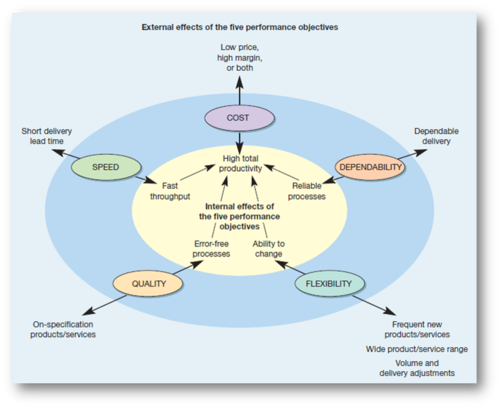
API Operations Donut (Operations Management book by Slack, Chambers & Johnston 2007)
Build an Engaging Developer Experience
Developers are your first users who would use your API in the first place. If developers do not find an engaging experience while working with your API, they might look for other alternatives.
According to Musser, you can follow these practices to increase developer engagement:
- Clear info about API’s goals.
- Quick sign up
- Absolutely free and smooth.
- Clear display of pricing.
- Deliver crisp and clear documentation.
Further, you can build a developer platform. Developers can post their queries and get answers if they have issues while using your API. Additionally, a developers program will provide a clear value to developers and a great brand value for your business. Here are the elements of the developer program displayed by RedHat.
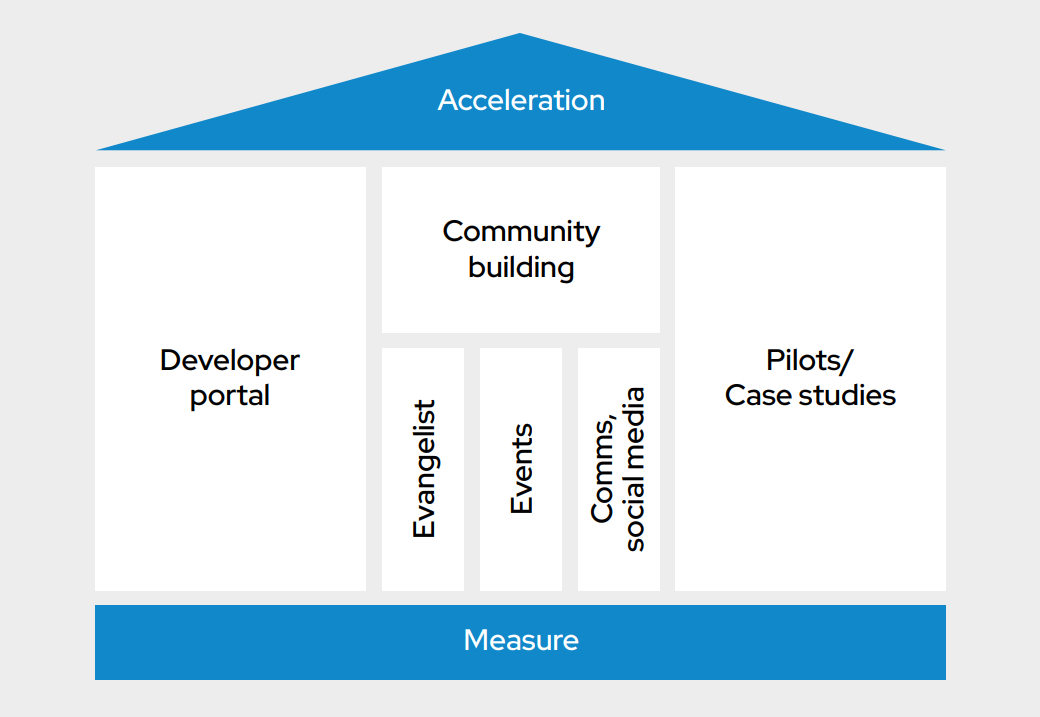
Step Beyond Marketing
Some enterprises build APIs but only market them at technical portals like Hackathons. You must market your API just like you market any other product. Though, The main concept should be to market it to the right person. Some entrepreneurs having IT businesses are not at all from technical backgrounds. But they might be interested in your API.
Market your API by using the following:
- Perform proper Segmentation
- Evaluating the Targeted market
- Correct Positioning in the minds of consumers.
Hence by performing the steps, you can initiate the right marketing process for your API.
Don’t Forget Maintenance and Updates in Your API
After a heavy designing, developing, and marketing process, your API may reach the right users. But, if your API does not align with developers’ feedback, it won’t survive long enough.
Specifically, ensure that you:
- Solve bugs regularly
- Keep Optimizing your API.
- New methods and functions to make it fluid.
- Remove unwanted methods that demand more resources.
- Roll out the latest versions of your API.
Once you maintain it right, you increase the lifecycle of your API.
Technical Tips to Keep in Mind While Building APIs
API specification framework: You can stick to specifications like OpenAPI/Swagger for better tooling interoperability. Also, focus on SDKs, UI points, and documentation every time your code changes.
Versioning: Enforce versioning information in your APIs so that users can see if they are running on the old version. Generally, version information is given in a URL like this.
Filtering and Pagination: Use LIMIT and OFFSET statements on queries for filtration and pagination. Here is a MySQL statement example to return the slice.
SELECT * from customers LIMIT 5, 10And a JSON response.
// _links
{
“first”: “/api/v1/customers?page=1”,
“prev”: “/api/v1/customers?page=1”,
“next”: “/api/v1/customers?page=3”,
“last”: “/api/v1/customers?page=9.”
}
Use REST and HATEOAS: Apply some design considerations like exposing a list of orders at the endpoint:
Secure endpoints: Ensure HTTPS connections for secure communications.
API Development Tools
- Apigee: It is Google’s API management tool assisting users in boosting their digital transformation.
- API Science: This tool aims to evaluate the performance of internal and external APIs.
- Postman: API Toolchain empowering developers to test and run performance evaluation of APIs.








